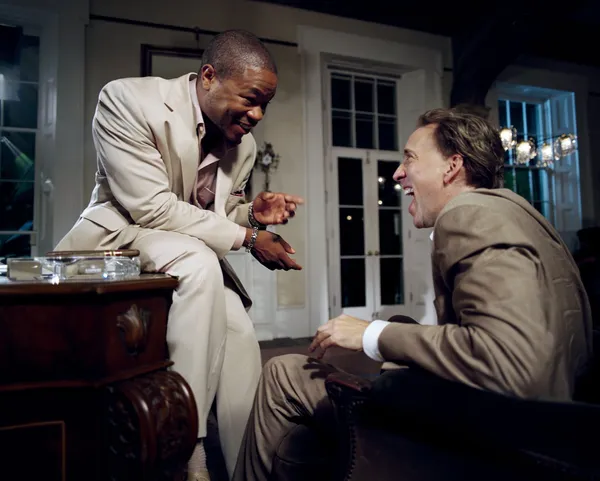Eye For Film >> Movies >> Bad Lieutenant: Port Of Call New Orleans (2009) Film Review

Abel Ferrara's Bad Lieutenant (1992) represented some kind of high (or is that low?) point in the annals of scuzzy cinema. Following a corrupt Catholic New York cop as he tried to juggle his addiction to hard drugs and high-stakes gambling with an investigation into the rape of a nun, Bad Lieutenant seemed determined, in both its lo-fi aesthetic and its oh-so-confronting themes, to send any seeker of mainstream thrills fleeing for the nearest bath – and yet the film's squalor, coupled with a central performance that was unusually exposed even by the standards of Harvey Keitel (memorably reduced in the final scenes to pained animalistic groans), offered up a brand of redemption so utterly, bleakly raw that it transcended the cliches of the traditional 'sinner saved' narrative arc.
In other words, Bad Lieutenant was a one-off – difficult, repellent even, and, you would think, utterly immune to ever being remade. Which brings us to Bad Lieutenant: Port Of Call New Orleans. When he heard of this project, Ferrara used a Guardian interview to place on the public record his belief that those involved in the production "should all die in hell". Yet, in this secularised reimagining directed by Werner Herzog - who claims never to have seen Ferrara's original - the Catholicism is gone, redemption is replaced with a worldly sort of karma and hell is a place very much of our own making here on earth.

Not that the film lacks religious imagery to fill out its moral landscape. Set in New Orleans, and opening with the vision of a serpent slithering its way through the rising waters of the flood, the film mostly takes place in a post-diluvian city, where everyone is still struggling to keep their heads above water, with satanic temptations never far away.
The bad lieutenant of the title is Terence McDonagh (Nicolas Cage), promoted to that rank because of a flood-time act of valour that also left him with chronic back problems. Though erratic, volatile and "crazy" (a recurring epithet), Terence clearly has far more scruples than his murder-happy partner Stevie (Val Kilmer) – but he has been on a downward spiral ever since his accident, supplementing prescription painkillers with illicit drugs that he either 'requisitions' from the station's property room, or just plain steals from users in the street – and the effect of so much drug use is only further disorienting his moral compass.
Terence's philosophy, stated halfway through the film, goes: "It's amazing what you can get down to when you've got a single purpose in life" - and so it seems, when he is put in charge of investigating the execution-style murder of a family of illegal Senegalese immigrants, that our wayward detective may at last have found his proper focus. It is, however, hard to stay on the straight and narrow when your drug supply is always threatened, your gambling debts to the mafia are mounting, you have taken upon yourself the problems your prostitute girlfriend is having with a seriously 'connected' client, there is a trio of vicious gangsters on your tail, the drug-dealing killer you are supposed to be putting behind bars is becoming your business partner, and everywhere you look you are starting to see lizards that are not there. All these distractions keep pulling Terence from the path of righteousness, until he stumbles, seemingly by chance, upon an ending that is itself a considerable deviation from the one that made Ferrara's original so harrowing.
Meanwhile, Terence is surrounded by other characters who are also struggling against the tide towards a better life: his father (Tom Bower), a decorated police officer turned terminal alcoholic, who is trying to get back on the wagon; Terence's drug-addicted girlfriend Frankie (Eva Mendes) who is entering rehab; and even Big Fate, the homicidal narcotics kingpin (Xzibit) who is diversifying into more legitimate markets. Here, the conflict between right and wrong is constant, with the battle lines always shifting so that it is never entirely clear on which side Terence's ethical allegiances lie.
If Herzog's film pushes its characters beyond good and evil, then it also transcends the normal evaluative qualities of good and bad, taking its own preposterousness to rarefied outer limits so bafflingly bizarre that you will find yourself desperately scrambling for any reassuring signs that it is actually okay to be laughing so much.
Iguanas stare into the camera lens to the tune of Please Release Me (in a scene played out so long that it moves from funny to uncomfortable to something else altogether), the soul of a dead man gets up and dances, and a manically wired Terence threatens two sweet old ladies with his service revolver while insanely declaring: "You're the fucking reason this country's going down the drain!" Yes, this is a film that occupies the extremes, which have of course long been Herzog's favourite terrain. Even the title is challengingly ungainly – and Cage's performance, though nothing at all like Keitel's, is every bit as mesmerisingly over-the-top.
It is a cliché amongst critics to describe a film as being like another film 'on crack', but in the case of Bad Lieutenant: Port Of Call New Orleans, with its hyperbolic drug use ("I snorted what I thought was coke, it turned out to be heroin – I need to be at work in an hour"), such a claim turns out to be almost literally true. This movie is batshit bananas, but also, unlike Ferrara's original, unbelievably (and I mean unbelievably) entertaining. Your eyes will widen, your mouth will fall open, you will giggle hysterically and shift nervously in your seat, and, like some drug-addled chancer, you will no longer be sure which way is up and which is down. And that makes the ending – a Hollywood ending, no less – strangely subversive for its gleeful arbitrarines, as though all the conventional bromides of cinematic narrative were being conjured as a jacked-up hallucination.
No film by Herzog has ever been so defiantly mainstream – and yet at the same time this remains one of the director's craziest, most outlandish affairs. Finding a way out the other side of that contradiction is half the fun for the incredulous viewer – while the other half is constantly processing lines like "A man without a gun, that's not a man".
Reviewed on: 12 Oct 2009

















